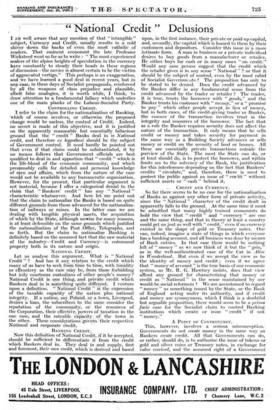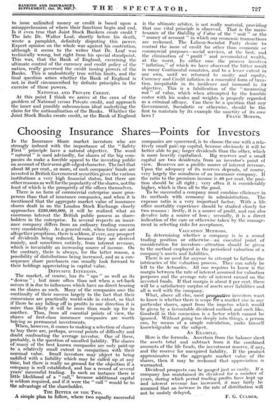— a - National Credit " Delusions I AM well aware that any
mention of that " intangible " subject, CUrrency and Credit, usually _results in a cold shiver down the backs of even the most eathtilic of readers. That eminent economist the late Professor Wieksteed went so far as to -write : " The most experienced scalers of the alpine heights of speculation in the currency have constantly to steady their heads in these regions of discussion—the novice is almost certain to be the victim of aggravated vertigo."- This perhaps is an exaggeration, and we have learned a good deal in recent years, but in anFease, in these days of Socialist propaganda, reinforced by all the weapons of dais prejudice and plausible, albeit false analogies, it is worth while, I think; 'to draw attention to a fundamental fallacy which underlies one of the main planks of the Labour-Socialist Party.
. CONTROLLING CREDIT.
I refer to the claim for the nationalization of Banking, which of course involves, or otherwise the proposed change would be useless, the control of Credit. Indeed, no secret is made of this objective, and it is justified on the apparently reasonable but essentially fallacious ground that the " credit " Banks deal in is National credit, and therefore ex hypothesi should be the subject of Government control. It need hardly be pointed out that even if that claim could be substantiated, it by no ineans follows that Government officials are best qualified to deal in and apportion that " credit" which is the life-blood of the economic community, and which preslunably calls for detailed and personal knowledge of Kien and affairs, which from the nature of the case would not be available to any bureaucratic organizatiOn. HoWever,.: for the preient, that particular argument is not material, because I offer a categorical denial to the claiM that " Bankers' credit " has any " National " characteristic whatsoever. And here let: me point out that' the claim to nationalize the -Banks 'is based on quite different grounds from those advanced for the nationaliza- tion of railways or mines. In the latter case we are dealing with tangible physical assets, the acquisition of which'hY the State, although unwise for many reasons, is at least defensible on the same grounds which justified the 'nationalization. of the, Post _Office, Telegraphs, and so forth. But the claim to nationaliie Banking is definitely based on the assumed fact that the raw material of the industry—Credit and Currency—is coMmunal property both in its nature and origin.
NATIONAL CREDIT.
Let us analyse this argument. What is " National Credit " ? And has it any relation to the credit which many of us have to seek from time to tinie, with timidity or effrontery as the cage niay IA, from those forbidding but icily courteous custodians of other people's money ? National Credit is one thing, and_ private credit which Bankers deal in is soniething quite different. I venture upon a definition. " National Credit " is the expression of the taxable capacity or the nation plus national integrity. If a nation, say Poland, or a town, Liverpool, desires a loan, the subscriberi to the sameconsider the reputation of the 'community, or the resources of the Corporation, their effectiVe powers of taxation in the one case, and the rateable capacity,_ of the town in the other. These considerations govern their respective National and Corporate Credit. ‘•
BANKING CREDIT.
Now this definition of National Credit, if it be accepted, should be sufficient to differentiate it from the Credit which Bankers deal in. They deal in and supply, first and foremost, their own credit, which is derived and based upon, in the first instance, their private or paid-up capital, and, secondly, the capital.which is loaned to them by their Customers and depositora. Consider this issue in 'a more intimate form. A man in business or a private individual desires to buy goods from a manufacturer or retailer. Re i-either buys for • cash or inniany eases " on-credit." Would any sane person suggest that the credit which the retailer gives is in any sense " National " ? or that it should be the subject of control, even by the most rabid of Socialist Governments ? The proposition has only to be stated to be denied. Does the credit advanced by the Banker differ. in any fundamental sense from the credit advanced by the trader or retailer ? The trader, it is true, trusts the borrower with " goods," and the Banker trusts his customer with " money," or a " promise to pay " which. other .people accept, in lieu of money, but in both cases, of the credit-giving trader or Banker, the essence of the transaction involves trust in the integrity and resources of the borrower.' The fact that as a rule the Banker requires security does not affect the nature of the transaction. It only means that he sells credit or money and takes security for payment in the ,same way as a Building Society advances or sells money or credit on the security of land or houses. All these are essentially private transactions outside the purview of the State. The most the State can do, or at least shOuld do, is to protect the borrower, and within limits see 'to the solvency of the Bank, the justification for-this interference depending on the fact that Bankers' credits " circulate," and, therefore, there is heed to protect the public against an issue of " credit" without sufficient assets or " cash " behind it.
CREDIT AND CURRENCY. . .
So far there seems to be no case for the nationalization of Banks as against any other forth of private activity, since the " National " character of the credit dealt in apparently falls to the ground. At the same tirne it must be admitted that many highly trained economists do hold the view that " credit ' and " currency " are one. and the -smile thing, and that in theory at least a country could get on just as well with "credit,' even if no currency existed in the shape Of gold or Treasury notes. One can, indeed, imagine a state of things in which everyone has a banking account, and all business was done by means of Bank entries. In that case there would be nothing left of " money " as we now think-Of it but the " grin," as in the well-autheiiticated Case: of the Cat in Alice in Wonderland. But even if we accept the view as to the identity of money and credit ; even if we agree that " money of account "isthe true baSis of our economic system, as Mr. R. G liaWtrey insists,- does that view afford any ground characterizing that money or credit as "National-" in the sense maintained by our would-be social reformers ? We are accustomed to regard "'money " as something issued by the State, or the Bank of England acting under its authority, and if credit and money are synonymous, which I think is a doubtful but .arguable proposition, there would seem to be a prima fade case for the Socialist claim to control Banking institutions which create" or issue " credit " if not " money." A POINT OF CONTROVERSY.
This, however, involves a serious misconception.' Governments do not create money in the same way as Bankers create credit. All that Governments can do, or rather, should do, is to authorize the issue of tokens or gold and silver coins or Treasury notes, in exchange for value received, and the assumed right of a Government to issue unlimited money or credit is based upon a misapfirehension of where their functions- begin and end. Is it even true that Joint Stock Bankers create credit ? The late Dr. Walter Leaf, shortly before his death, wrote a pamphlet, definitely disputing this power. Expert opinion on the whole was against his contention, although it seems to the writer that Dr. Leaf was technically wrong, but right from his special standpoint. This was, that the Bank of England, exercising the ultimate control of the currency and credit policy of the nation, really governed the credit issuing powers of the Banks. This is undoubtedly true within limits, and the final question arises whether the Bank of England is not, in itself circumscribed by definite principles in the exercise of these powers.
NATIONAL AND PRIVATE CREDIT.
At this point I think we arrive at the crux of the problem .of National versus_ Private credit, and approach the inner and possibly subconscious ideal underlying the claim for the nationalization of the Banks. Whether the Joint Stock Banks create credit, or the Bank of England is the ultimate arbiter, is not really material, providing that one vital principle is observed. That is the main- tenance of the Stability of Value of the " unit " or the " money of account " in which our economic transactions are reckoned. The Labour-Socialist Party desire to control the issue of credit for other than economic or commercial purposes—social services, at the best, and the elimination of " profit " and accumulated wealth, at the worst. In- either. case the process involves " inflation," of which we have observed the bitter result in many Continental countries, and to a lesser extent in our own, until we returned to sanity and equity. Currency and Credit inflation is a concealed form of taxa- tion, inequitable in its incidence and immoral in its objective. This is a falsification of the " measuring rod " of value, which when attempted by the humble coster with his scales and weights is properly regarded as a criminal offence. Can there be a question that any Government, Socialistic or otherwise, should be the first to maintain by its example the sanctity of its own



























































 Previous page
Previous page